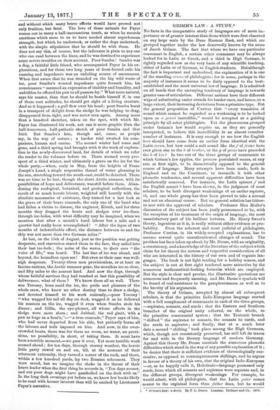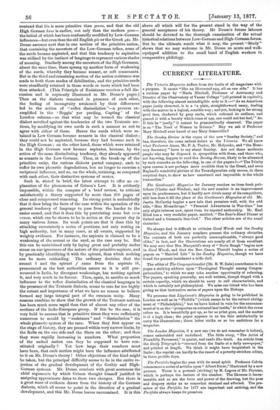GRIMM'S LAW : A STUDY.* No facts in the comparative
study of languages are of more im- portance or of greater interest than those which were first observed on any large scale by the Dane Rasmus Bask, and which are grouped together under the law deservedly known by the name of Jacob Grimm. The fact that where we have one particular consonant in English, a certain other consonant may be always looked for in Latin or Greek, and a third in High German, is rightly regarded now as the very basis of any scientific teaching, either of Latin or of German, to Englishstudents. Butalthough the fact is important and undoubted, the explanation of it is one of the standing cruces of philologists ; for in some, perhaps in the majority of instances it seems to be flatly opposed to the best- established and the most universal law of language. It is admitted on all hands that the unvarying tendency of language is towards greater ease of articulation. Different nations have their different ways of substituting easier sounds for harder ones, and hence, to a large extent, their increasing deviations from a primitive type. But the general proposition of Curtius that " every transition of sound which cannot be regarded as a weakening is to be looked upon as a priori incredible," would be accepted as a guiding principle by all sober philologists. Yet the phenomena grouped under Grimm's law would require us, as they are generally interpreted, to believe this incredibility in an almost counties number of instances. It is easy enough to see how the English horn should have come from an earlier form identical with the Latin cornu, but how could a soft sound like the f of frater have ever given rise to the b of brother, or the g of genus have preceded the k of kin ? In two out of the three groups of consonants to which Grimm's law applies, the process postulated seems, at any rate at first sight, to be diametrically opposed to the general course of language. Many attempts have been made, both in England and on the Continent, to reconcile it with other phonetic tendencies, and several apparent difficulties have been satisfactorily removed. For instance, the Latin spirant f and the English sonant b have been shown, in the judgment of most scholars, to be both divergent weakenings of an earlier aspirate, bh, and one whole group has thus been proved to take a normal and not an abnormal course. But no general solution has hither- to met with the approval of scholars. Professor Max Miiller's discussion of the subject has been justly pronounced to be, with the exception of his treatment of the origin of language, the most unsatisfactory part of his brilliant lectures. Mr. Henry Sweet's theory, ingenious as it is, is really without either evidence or pro.: bability. Even the soberest and most judicial of philologists, Professor Curtius, in his widely-accepted explanations, has to assume several quite unauthenticated changes of sound. The problem has been taken up afresh by Mr. Douse, with an originality, a consistency, and a knowledge of the literature of the subject which claim for his theory the serious and respectful consideration of all who are interested in the history of our own and of cognate lan- guages. The book is not light reading for a holiday season, and the subject is not at first sight rendered more attractive by the numerous mathematical-looking formula which are employed. But the style is clear and precise, the illustrative quotations are numerous and frequently amusing, and Mr. Douse's symbols will be found of realiassistance to the perspicuousness as well as to the brevity of his arguments.
The theory of Grimm, accepted by almost all subsequent scholars, is that the primitive Indo-European language started with a full complement of consonants in each of the three groups, —aspirates, sonants, and surds ; that the Eastern and Southern branches of the original unity adhered, on the whole, to the primitive consonantal system ; that the Teutonic branch " shifted " the aspirates to sonants, the sonants to surds, and the surds to aspirates ; and finally, that at a much later date a second " shifting " took place among the High Germans, which, though not consistently preserved, has still left its traces far and wide in the literary language of modern Germany. Against this theory Mr. Douse marshals the numerous phonetic difficulties which stand in the way of any possible explanation of it ; he denies that there is sufficient evidence of chronologically suc- cessive, as opposed to contemporaneous shiftings, and he argues in favour of a theory of his own, that the original Indo-European —or, as he happily calls it, Holethnic—language possessed only surds, from which all sonants and aspirates were separate and, in the different groups, divergent weakenings. For example, he would admit, with all philologists, that the Latin pater comes nearer to the orgininal form than father does, but he would
• Grimm's Law: a study. By T. L. Douse. London: Trtibner and Co. 1876. contend that kin is more primitive than genus, and that the old High German kens is earlier, not only than the modern gans- the initial of which has been confessedly modified by Low-German influences—but even than the old English gds or the Greek xtp. Mr. Douse assumes next that in one section of the primitive nation, that containing the ancestors of the Low-German tribes, some of the surds became aspirated, and that this tendency to aspiration was utilised by the instinct of language to represent various shades of meaning. Similarly among the ancestors of the High Germans, about the same time, there sprang up another form of weakening of the surds, whereby they became sonant, or soft consonants. But in the third and remaining section of the nation resistance.was made to both these modes of debilitation, and the primitive surds were steadfastly retained in those words or roots which had been thus attacked. (This Principle of Resistance receives a full dis- cussion and is copiously illustrated in Mr. Douse's pages.) Then as the dialects remained in presence of each other, the feeling of incongruity awakened by their differences led to the action of "reflex dissimilation "—a process ex- emplified in the Beggin' yer parding, Capting ' of the London cabman—so that what may be termed the classical dialect revolted against the tendencies of the two Teutonic sec- tions, by modifying its own surds in such a manner as not to agree with either of these. Hence the surds which were re- tained in Low German became sonants in the classical dialect ; they could not be aspirated, because they had become such in the High German ; on the other hand, those which were retained in the High German now became aspirates, because, by the action of the same dissimilating tendency, they already appeared as sonants in the Low German. Then, at the break-up of the primitive unity, the various dialects parted company, each to suffer its own phonetic degradations, but no longer to exercise a reciprocal influence, and so, on the whole, retaining, as compared with each other, their distinctive systems of mutes.
Such is, stated in brief, the latest attempt to offer an ex- planation of the phenomena of Grimm's Law. It is evidently impossible, within the compass of a brief review, to criticise satisfactorily a theory supported by more than 200 pages of close and compressed reasoning. Its strong point is undoubtedly that it does bring the facts of the case within the operation of the general tendency of language to pass from the harder to the easier sound, and that it does this by postulating none but vertu cause, which can be shown to be in action at the present day in many various forms. Its weak points are that it does this by attacking successively a series of positions, not only resting on high authority, but in many cases, at all events, supported by weighty evidence. For instance, the aspirate is claimed to be a weakening of the sonant or the surd, as the case may be. But this can be maintained only by laying great and probably undue stress on our ignorance of the nature of the primitive aspirate, and by practically identifying it with the spirant, than which nothing can be more misleading. The ordinary doctrine that the sonant b and the spirant f came from the aspirate bh, pronounced as the best authorities assure us it is still pro- nounced in India, by divergent weakenings, has nothing against it, and very much in its favour. Then, again, to ascribe so much influence to the reflex dissimilation of the classical languages in the presence of the Teutonic dialects, seems to rate far too highly the extent and importance of what we have no reason to believe formed any large integral part of the common unity. Many reasons combine to show that the growth of the Teutonic nations has been much more rapid than that of almost any other of the sections of the Indo-European group. If this be the case, it is very bold to assume that in primitive times they were sufficiently numerous to mould by " resistance " and " dissimilation " the whole phonetic system of the race. When they first appear on the stage of history, they are pressed within very narrow limits, by the Keith on the one side and the Slays on the other ; and then they were rapidly increasing in numbers. What proportion of the united nation can they be supposed to have con- stituted originally ? Yet how large their numbers must have been, that each section might have the influence attributed to it on Mr. Douse's theory ! Other objections of the kind might be taken, but the principal difficulty seems to lie in the entire re- jection of the gradual development of the Gothic and High- German systems. Mr. Douse combats with great acuteness the chief arguments by which Grimm thought himself justified in assigning approximate dates to these two changes. But there is a great mass of evidence drawn from the history of the German dialects, which all seems to point in the direction of a gradual development, and this Mr. Douse leaves unexamined. It is this
above all which will for the present stand in the way of the general acceptance of his theory. Mr. Douse's future labours should be devoted to the thorough examination of the actual historical relations between Low-German and High-German forms. But be the ultimate result what it may, the present "Study" shows that we may welcome in Mr. Douse an acute and well- equipped addition to the small band of English workers in comparative philology.







































 Previous page
Previous page